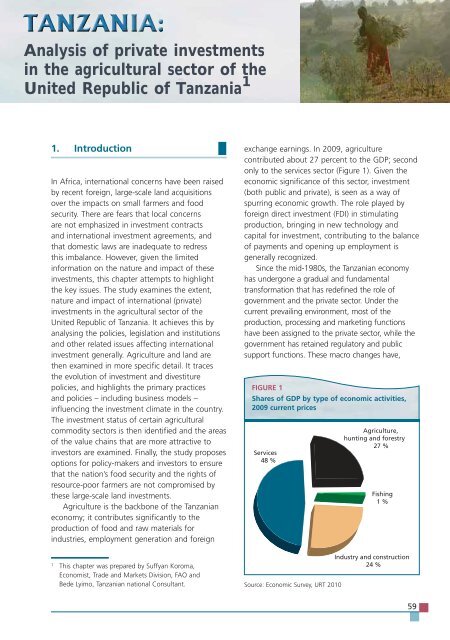TRENDS AND IMPACTS OF FOREIGN INVESTMENT IN DEVELOPING COUNTRY AGRICULTURE
TRENDS AND IMPACTS OF FOREIGN INVESTMENT IN DEVELOPING COUNTRY AGRICULTURE
TRENDS AND IMPACTS OF FOREIGN INVESTMENT IN DEVELOPING COUNTRY AGRICULTURE
You also want an ePaper? Increase the reach of your titles
YUMPU automatically turns print PDFs into web optimized ePapers that Google loves.
Analysis of private investments<br />
in the agricultural sector of the<br />
United Republic of Tanzania 1<br />
1. Introduction <br />
In Africa, international concerns have been raised<br />
by recent foreign, large-scale land acquisitions<br />
over the impacts on small farmers and food<br />
security. There are fears that local concerns<br />
are not emphasized in investment contracts<br />
and international investment agreements, and<br />
that domestic laws are inadequate to redress<br />
this imbalance. However, given the limited<br />
information on the nature and impact of these<br />
investments, this chapter attempts to highlight<br />
the key issues. The study examines the extent,<br />
nature and impact of international (private)<br />
investments in the agricultural sector of the<br />
United Republic of Tanzania. It achieves this by<br />
analysing the policies, legislation and institutions<br />
and other related issues affecting international<br />
investment generally. Agriculture and land are<br />
then examined in more specific detail. It traces<br />
the evolution of investment and divestiture<br />
policies, and highlights the primary practices<br />
and policies – including business models –<br />
influencing the investment climate in the country.<br />
The investment status of certain agricultural<br />
commodity sectors is then identified and the areas<br />
of the value chains that are more attractive to<br />
investors are examined. Finally, the study proposes<br />
options for policy-makers and investors to ensure<br />
that the nation’s food security and the rights of<br />
resource-poor farmers are not compromised by<br />
these large-scale land investments.<br />
Agriculture is the backbone of the Tanzanian<br />
economy; it contributes significantly to the<br />
production of food and raw materials for<br />
industries, employment generation and foreign<br />
1 This chapter was prepared by Suffyan Koroma,<br />
Economist, Trade and Markets Division, FAO and<br />
Bede Lyimo, Tanzanian national Consultant.<br />
exchange earnings. In 2009, agriculture<br />
contributed about 27 percent to the GDP; second<br />
only to the services sector (Figure 1). Given the<br />
economic significance of this sector, investment<br />
(both public and private), is seen as a way of<br />
spurring economic growth. The role played by<br />
foreign direct investment (FDI) in stimulating<br />
production, bringing in new technology and<br />
capital for investment, contributing to the balance<br />
of payments and opening up employment is<br />
generally recognized.<br />
Since the mid-1980s, the Tanzanian economy<br />
has undergone a gradual and fundamental<br />
transformation that has redefined the role of<br />
government and the private sector. Under the<br />
current prevailing environment, most of the<br />
production, processing and marketing functions<br />
have been assigned to the private sector, while the<br />
government has retained regulatory and public<br />
support functions. These macro changes have,<br />
FIGURE 1<br />
Shares of GDP by type of economic activities,<br />
2009 current prices<br />
Services<br />
48 %<br />
Source: Economic Survey, URT 2010<br />
Agriculture,<br />
hunting and forestry<br />
27 %<br />
Fishing<br />
1 %<br />
Industry and construction<br />
24 %<br />
59


